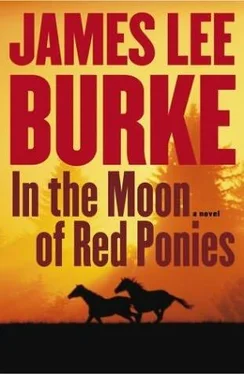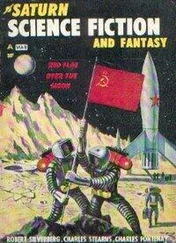James Burke - In the Moon of Red Ponies
Здесь есть возможность читать онлайн «James Burke - In the Moon of Red Ponies» весь текст электронной книги совершенно бесплатно (целиком полную версию без сокращений). В некоторых случаях можно слушать аудио, скачать через торрент в формате fb2 и присутствует краткое содержание. Жанр: Полицейский детектив, на английском языке. Описание произведения, (предисловие) а так же отзывы посетителей доступны на портале библиотеки ЛибКат.
- Название:In the Moon of Red Ponies
- Автор:
- Жанр:
- Год:неизвестен
- ISBN:нет данных
- Рейтинг книги:5 / 5. Голосов: 1
-
Избранное:Добавить в избранное
- Отзывы:
-
Ваша оценка:
- 100
- 1
- 2
- 3
- 4
- 5
In the Moon of Red Ponies: краткое содержание, описание и аннотация
Предлагаем к чтению аннотацию, описание, краткое содержание или предисловие (зависит от того, что написал сам автор книги «In the Moon of Red Ponies»). Если вы не нашли необходимую информацию о книге — напишите в комментариях, мы постараемся отыскать её.
In the Moon of Red Ponies — читать онлайн бесплатно полную книгу (весь текст) целиком
Ниже представлен текст книги, разбитый по страницам. Система сохранения места последней прочитанной страницы, позволяет с удобством читать онлайн бесплатно книгу «In the Moon of Red Ponies», без необходимости каждый раз заново искать на чём Вы остановились. Поставьте закладку, и сможете в любой момент перейти на страницу, на которой закончили чтение.
Интервал:
Закладка:
“The only gun I own is the one the cops took away from me.”
“Why’d you lay in wait for them? Why didn’t you get some help?”
“This is the res. People take care of themselves here. Ask any federal agent what he thinks about Indians. An Indian homicide is just another dead Indian.”
“I think maybe you know who sent Bumper and Ruggles after you.”
He seemed to study a thought that was hidden behind his eyes. “Ever hear of wet work?” he asked.
“Maybe,” I replied.
“You were a Texas Ranger and an assistant U.S. attorney, Billy Bob.”
“You’re saying the G sicced these guys on you?”
“What’s the G? It’s just the guys who are currently running things. I trained with people just like Bumper and Ruggles. Some of the old-timers had been in the Phoenix Program.”
The screen door opened behind us. “You telling Billy Bob about your dream?” Amber Finley asked. Her eyes were the bluest, most radiant I’d ever seen, her complexion glowing.
“What dream?” I said.
Johnny got up from the steps and walked across the yard toward the barn, his face averted. Amber watched him, a hand perched on one hip. “Isn’t he something else?” she said.
“What dream?” I said.
“He just told me, ‘All those dudes are going down. There’s nothing to worry about.’ I wish I could have dreams like that. Mine suck,” she said.
Chapter 4
My son was Lucas Smothers. Illegitimate, raised by a tormented, uneducated foster father, Lucas was living testimony to the fact that goodness, love, decency, and musical talent could survive in an individual who had every reason to hate the world. He had my eyes and reddish-blond hair and six-foot height, but oddly I thought of him as my son rather than of myself as his father. When I had a moral question to resolve, I asked myself what Lucas would do in the same situation.
He was in his second year at the University of Montana and lived in an old, maple-lined neighborhood west of the campus. His small apartment looked like a recording studio more than the residence of a college student. Microphones, stereo systems, amplifiers for his electric guitars, stacks of CDs and old vinyl records, as well as his instruments-a banjo, mandolin, fiddle, stand-up bass, twelve-string mariachi guitar, and his acoustical HD-28 Martin-covered every available piece of space in the living room.
He answered the door barefoot, wearing no shirt, his stomach flat inside his Wranglers. Over his shoulder I saw a young woman go out the back door and clang loudly down the fire escape. “Who was that?” I asked.
“A friend who stayed over. She’s late for class,” he said.
“It’s two o’clock in the afternoon.”
“That’s what I said. She’s late,” he replied.
I nodded, as though his response made perfect sense. “Wyatt Dixon is out of prison,” I said.
“I read about it in the newspaper,” he said. He started picking up clothes from the floor, some of which included a woman’s undergarments.
“I ran him off our place last night. But he’ll be back. Watch yourself,” I said.
“He’s not interested in me.”
“People like Dixon hate goodness. They try to injure it whenever they can, Lucas.”
“I ain’t afraid. I know you sure as hell ain’t. So what’s the big deal?” He pressed a button on his stereo and the amplified voices of Bonnie Raitt and John Lee Hooker almost blew me out of the room.
But I couldn’t get Wyatt Dixon off my mind that afternoon, or Johnny American Horse’s cavalier attitude about sharing information with me. I worked until late, my resentment growing. At 5:30 P.M. the courthouse square was purple with shadow, the trees pulsing with birds. I called Johnny at his house.
“You told Amber, ‘All those dudes are going down.’ How about some clarification on that?” I said.
“All power lies in the world of dreams. I have a dream about red ponies. It means I don’t have to worry about these guys who are after me,” he said.
“Then why were you carrying a gun?”
“Don’t represent me.”
“What?”
“You heard me.”
I felt my old nemesis, anger, flare inside me like a lighted match. Don’t say anything, I heard a voice say.
“You got it, bud,” I said, and hung up the phone.
I wish it had all ended right there. But it didn’t.
That evening, Temple and I had supper at a Mexican restaurant in town. The streets were full of college kids, people riding bikes over the long bridge that spanned the Clark Fork, tourists visiting the art galleries that had replaced the bars and workingmen’s cafes on Front Street. A tall man in a hat and a western-cut suit walked past the restaurant window. His face was lean, his skin brown, his lavender shirt stitched with flowers. He could have been a cattleman out of the 1940s. But Seth Masterson was no cattleman.
“What are you staring at?” Temple said.
“That guy at the corner. He was a special agent in Phoenix.”
“You sure? He seemed to look right through you.”
“I’ll be right back,” I said.
I caught up with Masterson before he could cross the intersection. “Why, hey there, Billy Bob,” he said, as though my face had been hard to recognize in the failing light. “What are you doing in Missoula?”
“Chasing ambulances. You know how it is,” I replied. “How about you?”
“A little vacation,” he replied, his eyes twinkling.
“Right,” I said.
“You ought to come back and work for the G.”
“Got any openings?” I said.
“You know me. I stay out of administration. Hey, I don’t want to keep you. Call me if you’re in Arizona.”
“Sure,” I said.
He crossed the intersection, then went into the Fact and Fiction bookstore. My food was cold when I got back to the table.
“What’s the deal on your friend?” Temple said.
“Remember the story about the FBI agent who wrote a memo warning the head office terrorists were taking flight instruction in Phoenix? The memo that got ignored?”
“That’s the guy?”
“He was at Ruby Ridge and Waco, too. Seth gets around.”
“You want your food reheated?”
“Why not?” I said. But even after the waitress warmed up my plate, I couldn’t eat. I wasn’t sure why Seth was in Missoula, but there were two things I was certain of: Seth Masterson didn’t take prisoners and I didn’t want him as an adversary.
Saturday morning I received a call at home from a man who was probably the most effective but lowest-rent attorney in Missoula. If a human being could exude oil through his pores, it was Brendan Merwood. His politics were for sale, his advocacy almost always on the side of power and greed. What he was now telling me seemed to offend reason.
“You represent Michael Charles Ruggles and he wants to see me?” I said.
“He likes to be called Charlie.”
“Why would ‘Charlie’ have any interest in me?”
“Put it this way-he’s not your ordinary guy.”
“My wife got that impression when he called her a bitch and expressed his thoughts about her anatomy.”
“I’m just passing on the message. Do with it as you wish, my friend,” he said, and hung up.
I drove to St. Patrick’s Hospital in Missoula and rode the elevator up to Charlie Ruggles’s floor. A sheriff’s deputy stopped me at his door. “You’re supposed to be on an approved visitors list, Billy Bob,” he said.
“Better check with the man inside,” I said, and grinned.
The deputy went into the room and came back out. “Go on in,” he said.
Instead, I stayed outside momentarily and pulled the door closed so Charlie Ruggles could not hear our conversation. “Was Seth by here?” I asked.
Читать дальшеИнтервал:
Закладка:
Похожие книги на «In the Moon of Red Ponies»
Представляем Вашему вниманию похожие книги на «In the Moon of Red Ponies» списком для выбора. Мы отобрали схожую по названию и смыслу литературу в надежде предоставить читателям больше вариантов отыскать новые, интересные, ещё непрочитанные произведения.
Обсуждение, отзывы о книге «In the Moon of Red Ponies» и просто собственные мнения читателей. Оставьте ваши комментарии, напишите, что Вы думаете о произведении, его смысле или главных героях. Укажите что конкретно понравилось, а что нет, и почему Вы так считаете.












